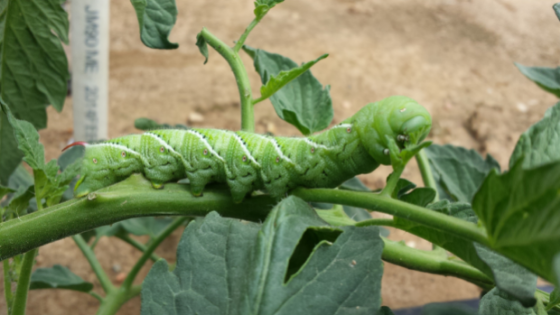 Whether you’re a master gardener with sprawling flower gardens or a novice with a container garden of vegetables and herbs on your balcony, one thing is certain: You need help from bugs to keep them thriving. Thanks to bug-lovers like Emily Zobel, who works for the University of Maryland Extension in Dorchester County, you can learn more about these intriguing insects.
Whether you’re a master gardener with sprawling flower gardens or a novice with a container garden of vegetables and herbs on your balcony, one thing is certain: You need help from bugs to keep them thriving. Thanks to bug-lovers like Emily Zobel, who works for the University of Maryland Extension in Dorchester County, you can learn more about these intriguing insects.
“I grew up in the suburbs and received my bachelor’s degrees in Ecology and Biology from the University of Maryland,” Emily says. “I had a great opportunity for an Entomology internship that emphasized insects in agriculture. I stayed on with the program and received my master’s degree in Entomology and now get to share my love of bugs through the extension.” Entomology is the branch of zoology concerned with the study of insects.
There are numerous insects that are good for both vegetable and flower gardens, whether on a farm or in your own backyard. These “beneficial insects” help your garden by eating pest insects that otherwise would feed on your plants.
There are three types of beneficial insects. Pollinators, which pollinate your garden’s flowers, include bees, butterflies and moths. Predators, which will eat pests, include ladybugs and praying mantises. And, parasitizers lay their eggs in or on the host insect and when they hatch, consume the host. This includes parasitic wasps.
To manage bugs that could damage crops, many Maryland farmers follow Integrated Pest Management (IPM). In this approach, farmers identify and monitor insects, evaluate how they are affecting their crops, and use resources, like pest-resistant plants, beneficial insects, and pest-specific chemicals, to manage pests safely and economically.
Want to make your garden thrive? Here are some of Emily’s tips for a successful garden:
- Practice IPM just like your local farmers. Emily says that you should not rid your garden of all bugs altogether, just keep them at a level where they don’t cause damage.
- When planting vegetables in your backyard, also plant a flower garden to attract insects. Emily says to try annuals like marigolds or native plants like Black-eyed Susan.
- Make a do-it-yourself insect screen for cold crops that don’t need to be pollinated, like collards, kale and cabbage. Emily made one for her own backyard garden using PVC pipes as the frame, then draped it with netting purchased at a local hardware store and secured the netting with bricks.
- When using insecticides or herbicides (for unwanted weeds), read labels carefully and thoroughly. Emily cautions that when used improperly, these products can kill seeds as well as beneficial insects.
- Listen to Emily’s “The Garden Thyme Podcast” to learn more about insects, native plants and gardening.
Lastly, don’t assume that every bug is bad. “If you’re not sure, take a picture and send it to our Ask an Expert site where a plant or bug expert will respond with what it is and what to do,” Emily says. “Don’t jump to conclusions — and enjoy them! If you find insects munching on your plants, enjoy watching them and sharing the environment with them.”
Hungry for more? Find out more about insects. Watch some videos at UME’s Home and Garden Information Center.
Sign up for our newsletter and find us on Facebook, Twitter and Instagram.


I have a hard time finding the tomato horn worm pictured above on the plant. The damage is clear but the worm stays hidden. I have an organic garden so no spray to stop them. I hand pick them for the chickens but have recently gotten a black light flashlight. They are inexpensive & light up the worms on the plant so they are easy to find & hand pick. Perhaps you could pass this helpful hint along so other gardners won’t use pesticides for a first choice.
That’s great, Cynthia! We appreciate your feedback on the topic.